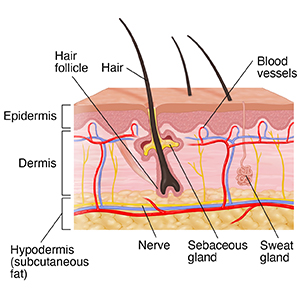Anatomy of the Skin
Facts about the skin
The skin is the body's largest organ. It covers the entire body. It serves as a protective shield against heat, light, injury, and infection. The skin also:
-
Regulates body temperature
-
Stores water and fat
-
Is a sensory organ
-
Prevents water loss
-
Prevents entry of bacteria
-
Acts as a barrier between the body and its environment
-
Helps to make vitamin D when exposed to the sun
Your skin takes on different thickness, color, and texture all over your body. For example, your head contains more hair follicles than anywhere else. But the soles of your feet have none. In addition, the soles of your feet and the palms of your hands are much thicker than skin on other areas of your body.

The skin is made up of 3 layers:
Each layer has certain functions.
|
Layer
|
What it does
|
|
Epidermis
|
The epidermis is the thin outer layer of the skin. It consists of 2 primary types of cells:
-
Keratinocytes. Keratinocytes comprise about 90% of the epidermis and are responsible for its structure and barrier functions.
-
Melanocytes. Melanocytes are found at the base of the epidermis and make melanin. This gives the skin its color.
|
|
Dermis
|
The dermis is the middle layer of the skin. The dermis contains:
The dermis is held together by a protein called collagen. This layer gives skin flexibility and strength.
|
|
Subcutaneous fat layer
|
The subcutaneous fat layer is the deepest layer of skin. It consists of a network of collagen and fat cells. It helps conserve the body's heat and protects the body from injury by acting as a shock absorber.
|